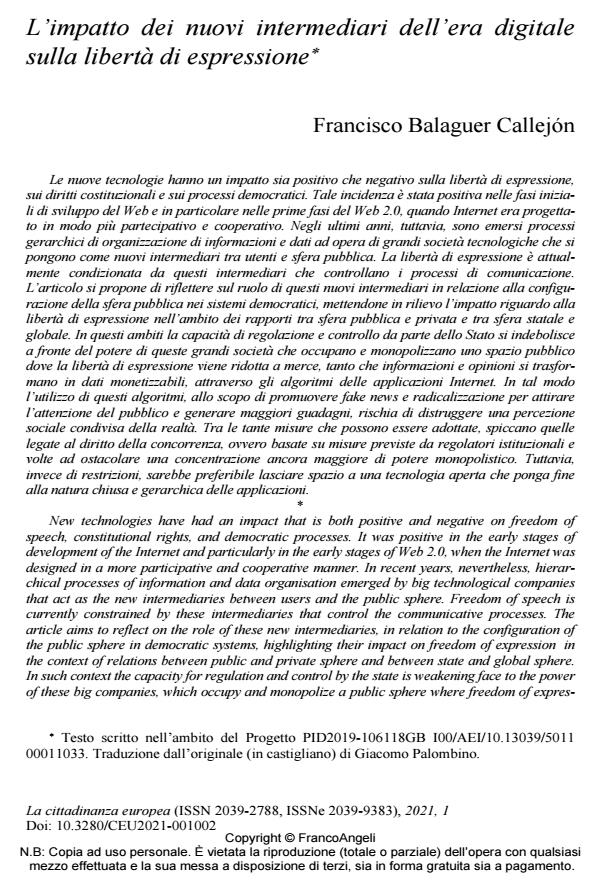L’impatto dei nuovi intermediari dell’era digitale sulla libertà di espressione
Journal title CITTADINANZA EUROPEA (LA)
Author/s Francisco Balaguer Callejón
Publishing Year 2021 Issue 2021/1
Language Italian Pages 30 P. 33-62 File size 261 KB
DOI 10.3280/CEU2021-001002
DOI is like a bar code for intellectual property: to have more infomation
click here
Below, you can see the article first page
If you want to buy this article in PDF format, you can do it, following the instructions to buy download credits

FrancoAngeli is member of Publishers International Linking Association, Inc (PILA), a not-for-profit association which run the CrossRef service enabling links to and from online scholarly content.
New technologies have had an impact that is both positive and negative on freedom of speech, constitutional rights, and democratic processes. It was positive in the early stages of development of the Internet and particularly in the early stages of Web 2.0, when the Internet was designed in a more participative and cooperative manner. In recent years, nevertheless, hierarchical processes of information and data organisation emerged by big technological companies that act as the new intermediaries between users and the public sphere. Freedom of speech is currently constrained by these intermediaries that control the communicative processes. The article aims to reflect on the role of these new intermediaries, in relation to the configuration of the public sphere in democratic systems, highlighting their impact on free-dom of expression in the context of relations between public and private sphere and between state and global sphere. In such context the capacity for regulation and control by the state is weakening face to the power of these big companies, which occupy and monopolize a public sphere where freedom of expression is reduced to a merchandise, so much so that infor-mation and opinions are transformed into data monetization, through the algorithms of Internet applications. Thus, the use of these algorithms to promote fake news and radicalisa-tion to attract the attention of the public and thus generate greater profit, risk to destroy a shared social perception of reality. Among the many measures that can be adopted, those related to competition law stand out, with institutional measures through regulators that may avert an even greater concentration of monopoly power. However, rather than restrictions, it is desirable an open technology that puts an end to the closed-off, hierarchical nature of applications.
- Estado social digital: a transformação digital dos serviços sociais Carlos Luiz Strapazzon, in Espaço Jurídico Journal of Law [EJJL] /2022 pp.87
DOI: 10.18593/ejjl.30342
Francisco Balaguer Callejón, L’impatto dei nuovi intermediari dell’era digitale sulla libertà di espressione in "CITTADINANZA EUROPEA (LA)" 1/2021, pp 33-62, DOI: 10.3280/CEU2021-001002